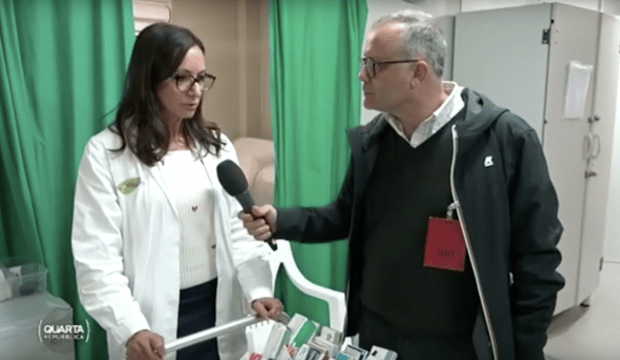Italian doctors raise the alarm: Long-defeated diseases are back

An Italian television report from an ambulance for migrants in the port city of Bari: A frustrated doctor tells of illnesses that are returning to Europe - from disinterest and ignorance not only of migrants, but also of the public and politics.
Italy's Coast Guard, the Guardia Costiera, has been rescuing illegal migrants in the Mediterranean for years from drowning and is always on alert. However, these are the Italian doctors in the hotspots, where incoming immigrants set foot on European soil for the first time. And they do not just in Sicily (to which also Lampedusa belongs). The television program "La Quarta Repubblica", recently zoomed in on the port city of Bari. The reporter, Francesco Fossa, is not known for sensationalism or sensationalism, on the contrary, his report is very balanced and calm - and is very worrying .
Fossa goes straight into the reception center of the port city of Bari, into the medical center, a kind of ambulance, where the migrants are first examined and registered. He asks the medical director at the reception center, Mariarosaria Ferrante, under what conditions do migrants arrive when they get off their boats or sailing ships like "the Ocean Viking,". In somewhat precarious circumstances, in terms of "hygiene" and health, the illegal migrants would arrive in Bari, answers Ferrante. The medical department and the attending physicians compile a personal file of the data about each individual. Of course, this "patient record" also notes the infectious diseases that need to be taken into account and that have now arrived in Italy with the migrants.
For example, "Scabbia", the scabies, quizzically interrogates the reporter. The doctor confirms this, properly, scabies, but then of course the different types of tuberculosis. The doctor speaks openly, but you can tell that the topic is uncomfortable (or very delicate?). Anyway, Doctor Mariarosaria Ferrante explains well. Yes, types of tuberculosis that have not been seen in Italy for "decades" that you simply were not confronted with anymore. Tuberculosis that gets stuck in the bones, but also diffuse in other organs. She does not want to talk about the HIV numbers.
Especially in the past eleven years more than 34,000 migrants have been examined during their "transit" in this outpatient clinic. The collected data, however, would never leave these premises. There is no infrastructure and no sophisticated information network - not in Italy, not in the EU. And, the author of these lines can add from his own experience in the refugee work, the migrants who come to Germany or elsewhere, start the whole medical procedure from scratch. In other words, the tuberculosis that has been diagnosed, of whatever type, is neither treated nor looked after further, because there are no means and forms of treatment for it at all (and if so, perhaps too expensive?).
The doctor now describes things that make one's hair stand on end: "There is no network, and so we have many small outpatient stations, like here ..."
Around half of the migrants leave the center with the sick registration, even before the asylum procedure comes to a conclusion. And with that, even any medical treatment is simply stopped. The migrant moves on, and with him as a carrier of the the diagnosis and the disease. The data, blood values and medical records are indeed in the files, but do they agree later with the identity and the name of the infected?
The Italian doctor now lets her index finger circle, and describes the problem: "The whole work loses value, as the patient moves on, and with him the infection. In Italy, in Europe, tuberculosis is spreading ... ". Doctor Ferrante's proposals, ideas and letters have hitherto been ignored by politicians.
What about HIV? The doctor says that not every migrant is allowed to undergo a blood test that is voluntary. Overall, the doctor, estimates that from those who have been screened, around five percent have been identified as carriers of HIV - in a low voice she adds that, however, all would know that the numbers on the African continent are inaccurate, and above the screened five percent.
The thinking of many African immigrants is also bizarre: according to Mariarosaria Ferrante, apparently they do not want to give blood because they assume that it will then be sold on. Nobody seems to be willing to fight against the ignorance of the migrants, which is probably quite large, adds the reporter. There is a real informational emergency about such cases.
However, the expert has the last word, and that could hardly be more harsh: "It is clear that at some point we will get tired of repeating the same thing over and over again, but there does not seem to exist any interest...". The health of the migrants, after all, is ours too. One might add: their illnesses too.
Source:



